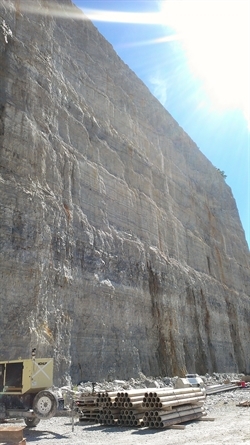
MPC
Modern water technology offers potential benefits, but is still reliant on policy for implementation.
For our 2013 Annual Luncheon blog series, we're discussing "Accelerating Change"—the theme of this year's Annual Luncheon. Experts from outside and inside MPC will bring their thoughts to the table on how technology is helping our cities meet the challenges and opportunities facing them today and tomorrow.
Recently I attended the “Last Blast” at the future site of Metropolitan Water Reclamation District of Greater Chicago’s (MWRD) Thornton Reservoir, part of MWRD’s ambitious Tunnel and Reservoir Plan (TARP). The event marked the end of major excavation at the reservoir and the beginning of the end of work on what by late 2015 will be a 7.9 billion gallon storage facility. The reservoir will store stormwater and wastewater overflows that would otherwise overwhelm treatment facilities. TARP is an incredible engineering feat that continues to be a model for other wastewater treatment facilities around the world. It hasn’t been a quick process, though; construction of TARP began in 1972, 41 years ago, and will not be completed until 2029. In the meantime, weather patterns in our region will continue to evolve, and the next generation of technological solutions to stormwater problems needs to take into account a quickly changing world. While the tunnels and reservoirs are critical, factors such as increasingly urbanized communities and more intense and frequent storms require us to pair that solid infrastructure investment with more nimble and flexible innovation.

Construction of TARP began in 1972 for completion in 2029.
For example, to improve management of stormwater through green infrastructure, engineering and environmental firm Geosyntec Consultants has developed a dynamic rainwater harvesting system that can be programmed to proactively empty water out of the system ahead of anticipated rain events, providing consistent stormwater storage capacity. In a similar vein, the City of Chicago has been experimenting with permeable pavement and “green streets” that not only capture rainwater, but also eat smog, calm traffic and more.
In terms of water supply management and conservation, the U.S. Environmental Protection Agency’s WaterSense program has spurred development not only of low-flow plumbing fixtures, but also smart lawn sprinkling systems that can check for soil moisture and only water lawns when they need it, rather than on a time-based system. On the user end, H2Oscore, one of the new firms taking advantage of Milwaukee’s water tech incubator, has developed a system that combines a water use dashboard with a Groupon-like rewards system to help water consumers better understand and improve their water usage, while providing the possibility for aggregating water use data to better inform researchers.
Infrastructure repair for drinking water, wastewater and stormwater is one of the biggest challenges facing cities today. Water infrastructure generally runs on pretty basic physics. In fact, many communities are only now digging up and replacing 100-year-old wooden water and sewer mains. But replacing pipes is expensive, and many municipalities have no funds to do it right now. New technologies to reduce costs have been developed—for example, in situ main repair and lining, which MPC Program Director Josh Ellis encountered when he was in Germany recently, allows for a cheaper option than tearing up streets and digging up pipes; instead, machines reline them from the inside. But sometimes, the question isn’t only one of cost. Policies often need to be changed as well.

Josh Ellis learning about wastewater treatment in Hamburg, where the facility is net energy positive thanks in part to the biogas digesters in the backgorund.
On the trade show floors of conferences like WEFTEC, the disconnect between technological change and policy change becomes immediately apparent. And although technologies have existed for some time to reuse non-potable water efficiently and safely, MPC is on its sixth year working with the Ill. Dept. of Public Health to allow even the most basic water reuse systems. And while technology exists to do less expensive water and sewer main lining, few local governments are able or willing to raise revenue that could pay for infrastructure repair.
At MPC’s upcoming annual luncheon, we’ll be hosting keynote speaker Margo Georgiadis of Google who will be speaking on technology and change. I’m looking forward to a discussion on ways to work to improve the gap between the development of new technologies and the ability of communities to use them.
Much of our water supply and stormwater work at MPC attempts to do that by helping communities on the ground position themselves to better invest in their infrastructure and take advantage of new technologies, while also working at the regional and state policy levels to help eliminate the regulatory barriers to innovation and spur new markets for technologically advanced solutions to water infrastructure problems.